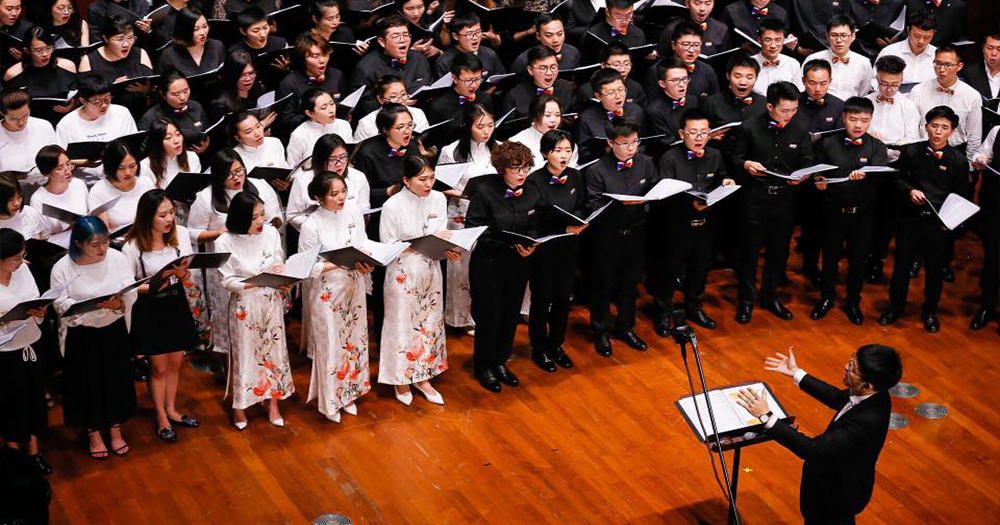A swift growth of LGBT+ choirs across Asia has highlighted a significant change for representation of queer rights.
During a sold-out concert in the capital Seoul, Unnie Choir, a group of South Korean women, sang about the joys and stigma of being LGBT+ in Asia. Wearing bright bow ties and dark dresses, they fought against the taboo surrounding homosexuality through song.
Speaking to the Thomson Reuters Foundation, the music director and conductor of the 15-strong choir, Chung Ui-jung, said, “Through singing, we’re saying homosexuality exists. We just want to be ourselves. Singing has the power to change.”
Founded in 2012, Unnie Choir, named after the Korean word for “sisters”, presents an alternative form of campaigning for LGBT+ rights and fighting against discrimination. They have performed at annual concerts and human rights events. The group have been described as the “K-pop for queer,” singing a wide range of styles from ballads to hymns and pop songs.
Unnie Choir tackle topics around LGBT+ prejudice, cyber bullying, feminism, and why South Korean women prefer to stay single. Their growing appeal has been attributed to their gentle stance on political issues, lessening the backlash from conservative parties and religious groups. Speaking to the Thomson Reuters Foundation, Seo Hee-jeong, 31-year-old woman, said she was drawn to their social messages, stating, “It’s my first time to see their performance but they are fun and engaging.”
Chung believes the growth of LGBT+ choirs is a sign of wider acceptance. She is confident one day her group will become as popular as other K-pop icons.
The music director and magazine editor also opened up about the fear of coming out to her parents. She said, “It is something that is hurtful to them. Maybe one day I will come out to my parents, but I haven’t found the courage yet.”
In 2003, South Korea’s first GBT+ choir G-Voice was created as a way for men to share their coming-out stories and foster a sense of community. Their music director, Jun Jae-woo said, “Coming out is a big decision for many gay men. We collect their stories and turn them into songs. It becomes easier when we’re together.”
The documentary Weekend follows the development of the choir and the men involved, released in 2017. It details their struggles against the pressure to continue the family blood line and live a hetereonormative lifestyle.
Since 2003, homosexuality is no longer classified as “harmful and obscene” in South Korea. However, South Korean President Moon Jae-in has received backlash from refusing to legalise gay marriage despite his stance against the discrimination of LGBT+ people.
The G-Voice director said, “Homophobic voices will continue to be loud.” However, the large number of LGBT+ choirs in Asia continue to sing over the hate. Each group finds a distinct way of expressing their struggles through touching and joyous songs.
With the multitude of groups across Asia, Proud Voices has connected numerous choruses together to continue the sense of community. On the Proud Voices website, they state, “We agreed that the community spirit which music creates should to be encouraged, and although we face many barriers here – geographical, cultural, political and linguistic – we are determined to overcome them. Proud Voices is a place for greater mutual understanding of our choirs. Since then many other lesbian, gay, bi and trans choirs in Asia have joined us.”
In 2014, Various Voices Dublin was the first time an Asian LGBT+ choirs performed at the festival. The Beijing Queer Chorus and G-Major Chorus took part in the four-yearly international LGBT+ choir festival. This was also the first time either groups had performed outside their home countries.
A member of G-Major Chorus, Garry, said, “Astonished by the opening concert, I was finally able to start taking pride in my identity and participation. After watching various groups perform, I started to realize that singing technique was not the focus, but that everyone is a champion, a winner just by being here.”
Garry further stated, “My eyes were full of tears, for there were endless sensations and love. My life will never be the same, and being a part of Various Voices will be the pride and honour of my life, forever.”
LGBT+ choirs are changing the face of campaigning across Asia, singing about issues which get overlooked or go unspoken. It is a powerful declaration of presence and promotes a sense of identity and community. The fast growth of groups highlights a move towards self-acceptance and celebration of all things queer.
© 2020 GCN (Gay Community News). All rights reserved.
Support GCN
GCN is a free, vital resource for Ireland’s LGBTQ+ community since 1988.
GCN is a trading name of National LGBT Federation CLG, a registered charity - Charity Number: 20034580.
GCN relies on the generous support of the community and allies to sustain the crucial work that we do. Producing GCN is costly, and, in an industry which has been hugely impacted by rising costs, we need your support to help sustain and grow this vital resource.
Supporting GCN for as little as €1.99 per month will help us continue our work as Ireland’s free, independent LGBTQ+ media.

comments. Please sign in to comment.